India’s ICT industry has long been strict with vendors, brands, telcos, and other ICT-related service providers. As the world’s second-largest consumer of smartphones, India is known for banning services and apps that pose even the slightest threat to digital security.
In a recent development, Reuters exclusively reported that India is taking further steps by introducing regulations that will scrutinize the software of smartphones before their sale in the country.
Under the new rules, India will examine preinstalled apps in smartphones, as well as the entire operating system, to identify security vulnerabilities. This process will significantly delay the launch of smartphones in the Indian market, which could result in substantial revenue losses for companies due to stiff competition.
India has always been committed to ensuring its national security, and government agencies and officials must use devices and services that meet the highest security standards for handling sensitive information.
However, the majority of smartphones sold in India are developed by Chinese manufacturers, which is a catalyst for these new regulations.
Notably, India has increased its monitoring of Chinese companies since the 2020 border dispute between India and China, resulting in the banning of over 300 Chinese apps, including TikTok, and heightened scrutiny of Chinese investments.
Similarly, several countries worldwide have implemented regulations limiting the use of Chinese technology companies such as Huawei and ZTE due to concerns that China may use them to spy on foreign nationals.
If the law is enforced, phone makers may lose the Indian market unless they ensure that pre-installed apps are set up as non-system applications, enabling users to uninstall them.
This could have significant implications for the smartphone business because brands usually collaborate with software vendors, who pre-install their apps into devices, and the benefits are mostly centered around ad revenues.
While preinstalled apps have allowed phones to be sold at competitive prices, the majority of customers find them intrusive and bad for the user experience.
Although the government has not yet announced the date for the implementation of the new rules, smartphone manufacturers will have one year to comply once they come into effect.





























